United Irishman, Vol. 36, No. 7
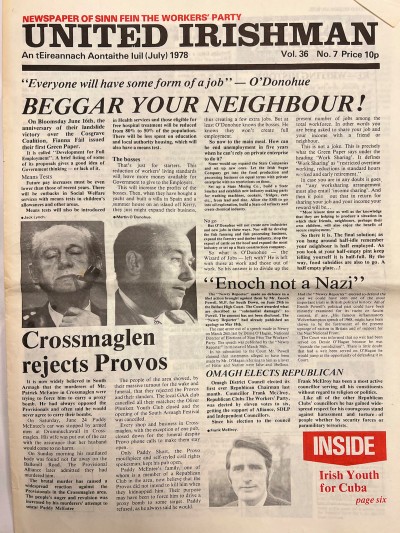
| Date: | 1978 |
|---|---|
| Organisation: | Sinn Féin The Workers' Party |
| Publication: | The United Irishman |
| Issue: | Volume 36, Number 7 Iuil (July) 1978 |
| Type: | Publication Issue |
| View: | View Document |
| Discuss: | Comments on this document |
| Subjects: |
Please note: The Irish Left Archive is provided as a non-commercial historical resource, open to all, and has reproduced this document as an accessible digital reference. Copyright remains with its original authors. If used on other sites, we would appreciate a link back and reference to The Irish Left Archive, in addition to the original creators. For re-publication, commercial, or other uses, please contact the original owners. If documents provided to The Irish Left Archive have been created for or added to other online archives, please inform us so sources can be credited.
Commentary From The Cedar Lounge Revolution
21st July 2025
This edition of the United Irishman shows a party in transition. The focus is on both North and South and some pieces that appear to address an audience in the United States. The headline article is on proposals by the then Fianna Fáil led Coalition to means test, cutbacks in Social Welfare, ‘less spent on education and local authority housing’ amongst others. But other pieces on the front page reference ‘Crossmaglen rejects Provos’, news that a Republican Clubs Councillor was elected in Omaha and a piece about a libel action brought against the Newry Reporter by Enoch Powell which has the headline ‘Enoch not a Nazi’. This on foot of a speech made in Newry that year by Dessie O’Hagan of SFWP.
The editorial is of particular interest because it argues that the Irish Times and RTÉ have ‘begun rewriting the history fo the civil rights struggle’. It argues that ‘in [the version of Austin Currie and Bernadette McAliskey] NICRA played no part and the role of the Republican Clubs is totally suppressed.
And it argues:
Bernadette Develin may have gone to the Coalisisland march out of curiosity and Austin Currie and other politicians may have gone there for opportunistic vote-catching reasons. But two people among those 5,000 marchers knew precisely what they were starting – Tomás Mac Giolla, leader of the Republican Clubs and Betty Sinclair of NICRA who chaired the meeting’.
A piece on the same page notes that a fund raising dance was held in New York by the Connie Green Irish Republican Club ‘to raise funds for the families of political prisoners now in jail in Ireland’. It also notes that ‘[Mr. John Lawe, President of Local 100, TWU was guest of honour and presented] with a beautiful model of an old Irish spinning wheel made by the prisoners in Long Kesh concentration camp in Northern Ireland…Mr. Lawe said that both Irish Americans and Irish people in the US want an immediate end to the continuous, brutal violations of human rights perpetrated by the English in Northern Ireland.’
A page is devoted to SFWP attendance at Bodenstown on June 18. As a piece notes, Councillor Seamus Lynch in his speech argued: ‘Despite the nightmare of empty violence, there is progress to be made, with delved government in the North as the primary base on which to build’. And ‘Such a governmental assembly should have 80 seats and should operate under an entrenched charter of democratic rights based on the NICRA model. Once democratic rights are thus guaranteed, government by the majority should apply after elections held under a system of proportional representation’. This is fleshed out in somewhat more detail in another piece.
Other pieces include ‘Irish Youth for Cuba’ and ‘Sean D. Loftus Opportunist’. There’s also a useful list of publications from the SFWP ‘National Book Service’.
More from The United Irishman
The United Irishman in the archive
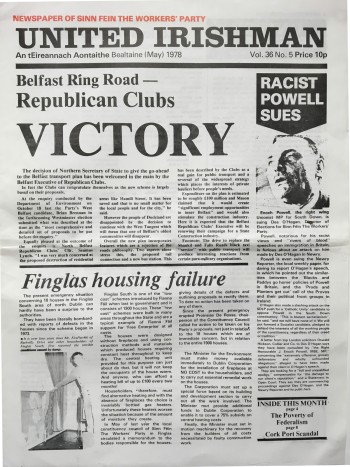
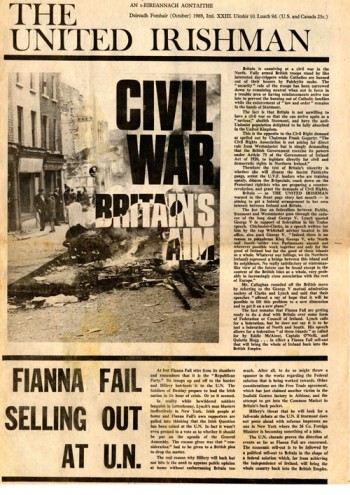
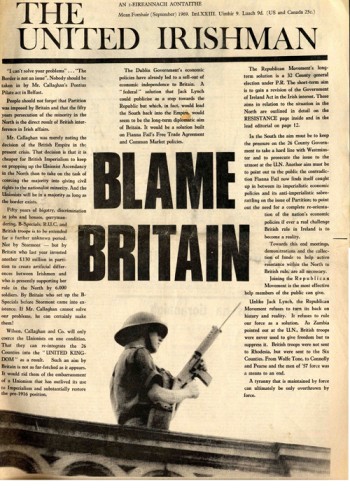
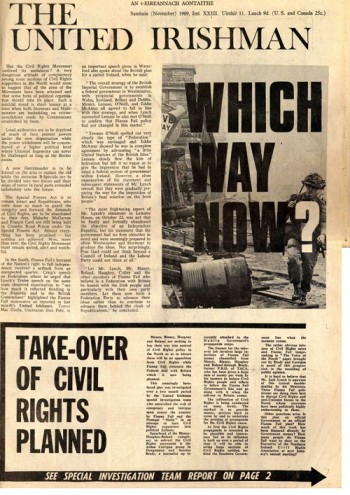
Comments
No Comments yet.
Add a Comment
Comments can be formatted in Markdown format . Use the toolbar to apply the correct syntax to your comment. The basic formats are:
**Bold text**
Bold text
_Italic text_
Italic text
[A link](http://www.example.com)
A link
You can join this discussion on The Cedar Lounge Revolution
By: WorldbyStorm Tue, 22 Jul 2025 07:27:56
In reply to banjoagbeanjoe.
On paper maybe that works but consider how even with a power sharing devolved assembly it has been impossible to introduce certain measures and this decades after 1978. How would a bill if rights work, who would enforce it? How would left/right politics emerge? Even assuming that that is an inevitable outcome (and in 2025 that’s not a given). It just seems wildly at odds with the lived political reality of the north – you’re right – others didn’t help but in a way that serves to point up how improbable the approach was, it’d need a completely different political context with different people and communities involved – it’s not a solution as much as a very very optimistic aspiration.
Now theres there’s the argument that some sort of imaginative solution was better than same old same old but this literally had barely abovezero traction in NI.
Reply on the CLR
By: roddy Tue, 22 Jul 2025 08:28:43
In reply to WorldbyStorm.
So Unionists and their voters who supported imperialism throughout the world including apartheid South Africa and Israel and still do would suddenly see the light because the likes of Des O’Hagan came up with a horseshit policy?
Reply on the CLR
By: WorldbyStorm Tue, 22 Jul 2025 09:42:53
In reply to roddy.
In a way the OSF position from the mid to late 70s was a function of isolation and others having taken the lead. The IRSP had the old OSF 1970-1972 position, on steroids and with some really problematic aspects, but was itself isolated and marginalised. The Provisionals had a new wrinkle on traditional Republicanism by actually prosecuting a conflict in the North. The SDLP had come up with the most sophisticated political arrangement (power-sharing/cross-border links etc etc). None of those ‘worked’ as such, each had failed in different ways and at different times (arguably the IRSP one most obviously given the Officials couldn’t square radical activism and armed campaign). And the key thing is that the Officials couldn’t adopt any of those positions – because they were held by rivals, and bar the Irps bigger rivals.
So they essentially adopted the NICRA programme of 1968 or so with the cosmetic addition of a Bill of Rights that was supposed to magic away contradictions. But the problem was it made no sense – the situation wasn’t 1968, the armed struggle genie was out of the bottle (in no small part due to many in the Officials themselves), there was no returning to Stormont, short of power-sharing which meant no return to Stormont since Unionism wouldn’t accept that. There were multiple and well armed republican paramilitaries, the British had already carried out multiple criminal acts, the loyalists were no slouches in that regard either.
But worse again what was the constituency that would listen to this Bill of Rights/NI Assembly? Unionists had unionist parties who didn’t have any concern about the first part and were split over devolution or direct rule. Loyalists bar a tiny fringe of left curious members weren’t interested. The SDLP just continued largely on the power-sharing line. Alliance was not a factor. Republicans had SF and the IRSP as representing them to one degree or another. Who in all that mix was going to want to try to push things back to 1968 when in truth 1968 and before and right up to the prorogument of Stormont only proved that politics as was didn’t work – that a majoritarian devolved assembly was arguably the worst possible vehicle for the North?
Reply on the CLR
By: WorldbyStorm Tue, 22 Jul 2025 10:58:29
In reply to Seán Ó Murchadha.
Sounds like he was in the WP longer than I was and outstayed me! In a way I got to admire that. Brian Hanley has written about how organisational loyalty and friendships often played a greater role than ideology in having people stay or go with one side or another in 1969 and of course after both in the Officials and Provisionals (86 etc). But Liam Kelly, amazing in a way. I get he’d wind up an Official, but I’d have loved to hear his thoughts on how things had changed.
Reply on the CLR
By: banjoagbeanjoe Tue, 22 Jul 2025 11:52:54
Just on the overall. Absolutely, it was a hopeless position to take/argument to make. Not just doomed to fail but doomed to not even get off the ground. History proved that. (And yes, I guess anyone on the ground at the time would have been able to say it was hopeless, without waiting for history to prove it.) But history didn’t exactly bestow medals on the other positions of other groups at the time… “war” until the “Brits” leave and all that that entailed; kill all taigs; return to majority rule with no Bill of Rights; etc etc. What we ended up with was on the table well before 1978 and in fairness to the SDLP, they got what they had been arguing for down the years and SF came on board.
So those people in SFWP at that time with their hopeless case for a Bill of Rights and a devolved government. Look where they’d come from, look what they’d come through. They came from Sinn Féin and the IRA, 1940s,50s and 60s. They were looking on in horror as the north broke down into sectarian murder hell. They weren’t perfect by any means. Jesus Christ, nobody ever is. But they saw the madness of “war” in such a powder keg society. They tried to shout stop. STOP THE KILLINGS. SECTARIANISM KILLS WORKERS. It was a hopeless case but I salute them for trying.
Reply on the CLR
By: roddy Tue, 22 Jul 2025 12:02:19
In reply to banjoagbeanjoe.
They were so incensed by sectarian killings that they cooperated in rackets and swapped weapons with the UVF,the most sectarian actor in the troubles.
Reply on the CLR
By: Colm B Tue, 22 Jul 2025 16:36:48
To be fair Roddy, most ordinary members of the WP were unaware of those dealings with the UVF and the other shenanigans of the OIRA. In fact, in the south at least, most members bought the leadership line that these were just slanders by the enemies of the party.
Undoubtedly the leaders of the party were hugely hypocritical in their denunciations but in as much as I recall, most members sincerely believed in the ideal of working class unity etc.
We, of course, have the benefit of hindsight from which position those ordinary members look like total fools but that could equally be applied to the ordinary members of SF and PIRA with the knowledge we now have of Steaknife etc. We could relitigate every twist and turn of the republican movement – who was right when, who was partly right, who was completely wrong etc etc but to what end? It certainly is worth studying that history but with the purpose of learning lessons for today’s struggle rather than judging the actions of the past.
As I have stated before I think the WP went way off track in appeasing unionism and cooperating with the British state but I think their opposition to the armed campaign of the PIRA was correct (though that critique was thoroughly undermined by the continued activity of the OIRA). But, again, hindsight!
Reply on the CLR